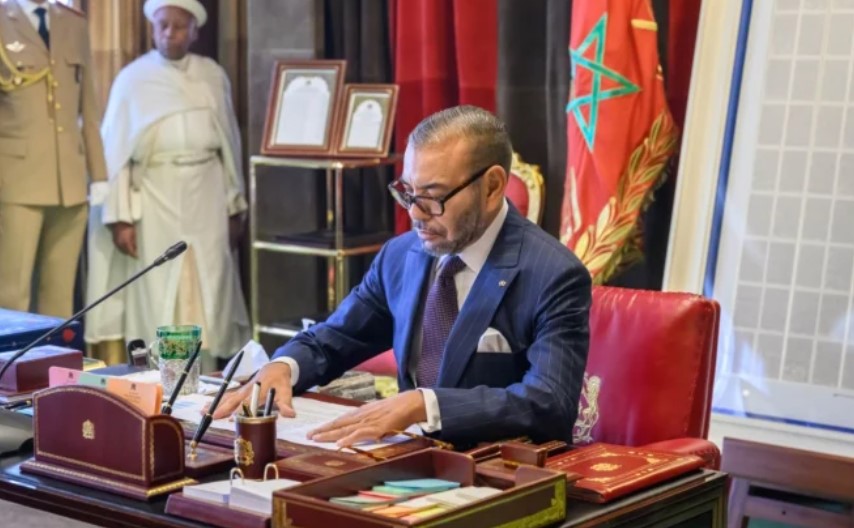On Friday, October 18, 2024, corresponding to the 14th of Rabii II 1446 H, His Majesty King Mohammed VI, may God assist Him, chaired a Council of Ministers at the Royal Palace in Rabat. The meeting focused on the review of the general orientations of the 2025 Finance Bill and the approval of several military decrees, international agreements, and high-level appointments across various sectors.
Presentation of the 2025 finance bill
At the start of the session, in accordance with Article 49 of the Constitution, Morocco’s Minister of Economy and Finance presented the key points of the 2025 Finance Bill before His Majesty the King. The minister emphasized that the bill was drafted amid a challenging international environment, marked by geopolitical tensions and increasing climate crises. Despite these difficulties, Morocco has managed, under the wise leadership of His Majesty, to continue its economic and social reforms while maintaining macroeconomic stability, with a growth rate projected at 3.3% for 2024.
The Finance Bill is built around four strategic priorities aimed at strengthening social cohesion, safeguarding economic sovereignty, and fostering conditions for future generations to thrive:
- Strengthening the foundations of the social state: The focus will be on the effective implementation of social protection programs, including the expansion of Mandatory Health Insurance and the finalization of direct social aid programs, benefiting around 4 million households. Continued reforms in the health and education sectors will also be prioritized, alongside support for social dialogue and the reconstruction of regions affected by the Al Haouz earthquake and recent floods in the southeast.
- Promoting investment and job creation: His Majesty’s directives emphasize stimulating private investment and implementing the new Investment Charter. Key sectors include “Generation Green,” green hydrogen projects, clean energy transitions, and tourism development. Major water resource management projects and preparations for hosting the 2030 World Cup will also be prioritized. A comprehensive employment roadmap, focusing on high-impact sectors and supporting small and medium-sized enterprises, will accompany these efforts.
- Continuing structural reforms: The government will advance justice reforms, including expanding family courts and modernizing the judicial system through digitalization. Other reforms include furthering regionalization, restructuring public enterprises, and enhancing state shareholder policies. Fiscal reforms will also be implemented, alongside modifications to the Organic Law on Finance Laws.
- Preserving public finances: Measures to restore fiscal balance will be implemented, ensuring the financing of planned projects while reducing the budget deficit. The goal is to rebuild financial reserves to address future risks and crises.
The Finance Bill aims for a significant economic rebound with a growth target of 4.6% in 2025 and a limited inflation rate of 2%.
Military decrees and social improvements for security forces
Following the Finance Bill review, the Council approved seven decrees related to the military sector. Four of these concern improving the conditions for personnel in the Royal Armed Forces (FAR), Auxiliary Forces, and Civil Protection, including salary increases and adjustments in line with public sector wage hikes achieved through social dialogue. Other decrees focus on critical areas like cybersecurity and hospital management within the FAR.
International agreements and diplomatic engagements
In furthering Morocco’s international partnerships, the Council adopted 19 international conventions, including 16 bilateral and 3 multilateral agreements. Many of these agreements involve African nations and reflect Morocco’s growing influence on the continent, with several agreements aimed at investment protection, judicial cooperation, and maritime and air transport.
Of note, 13 bilateral agreements were signed with six African countries during joint commission meetings in Dakhla, located in the Moroccan Sahara. Additionally, the Council approved the establishment of the permanent headquarters of the Pan-African Institute for Development in Dakhla, underscoring Morocco’s leadership in Africa.
High-level appointments
As part of ongoing government restructuring, the Council approved the appointment of several Walis and Governors in Morocco’s central and territorial administrations. Key appointments include:
- Mouaad Jamai, Wali of Fès-Meknès
- Khatib El Hebil, Wali of the Oriental region
- Mohamed Benribag, Wali of Béni Mellal-Khénifra
In the diplomatic field, several ambassadors were appointed to represent Morocco abroad, including Othman El Ferdaous in Côte d’Ivoire and Ahmed Rida Chami to the European Union.
His Majesty also approved appointments in crucial sectors, such as health, where Mustapha Aboumaarouf was named President of the High Health Authority, and Latifa Moftaqir was appointed Director of Morocco’s National Archives.
